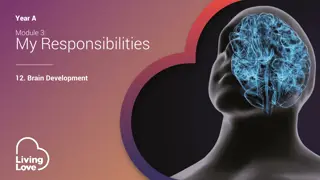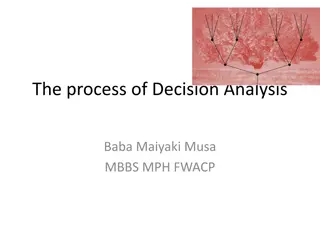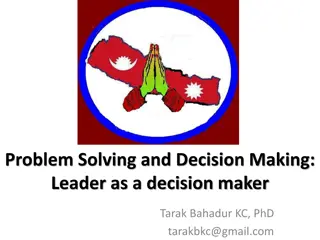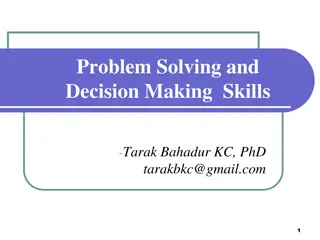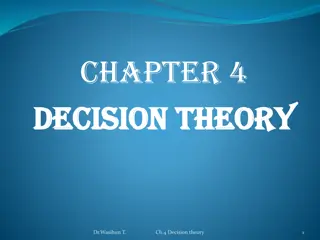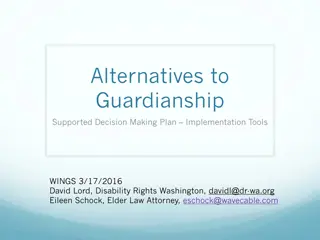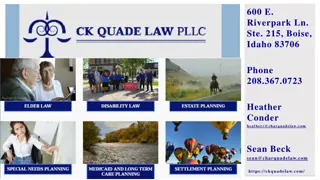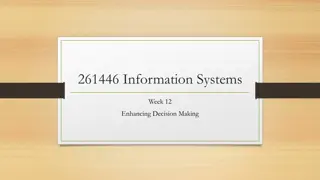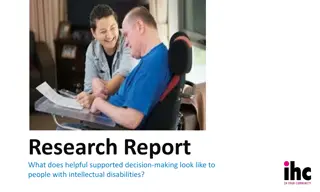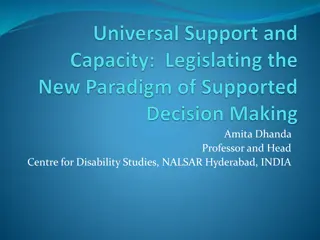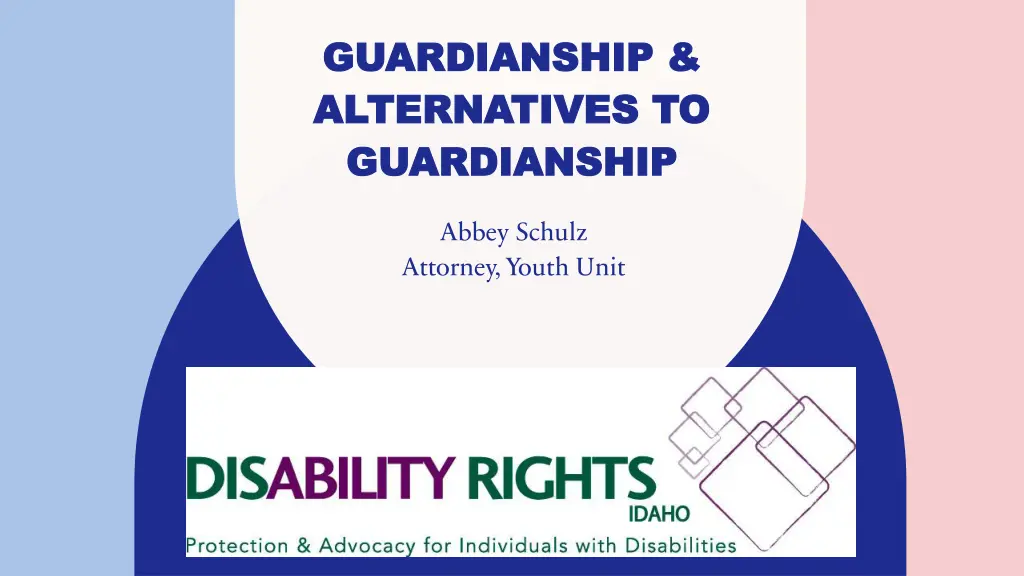
Guardianship and Alternatives Presentation by Abbey Schulz, Attorney at DisAbility Rights Idaho
Explore the presentation by Abbey Schulz, an attorney at DisAbility Rights Idaho, covering topics like transition services, guardianship, alternatives to guardianship, and more for individuals with disabilities in Idaho.
Download Presentation

Please find below an Image/Link to download the presentation.
The content on the website is provided AS IS for your information and personal use only. It may not be sold, licensed, or shared on other websites without obtaining consent from the author. If you encounter any issues during the download, it is possible that the publisher has removed the file from their server.
You are allowed to download the files provided on this website for personal or commercial use, subject to the condition that they are used lawfully. All files are the property of their respective owners.
The content on the website is provided AS IS for your information and personal use only. It may not be sold, licensed, or shared on other websites without obtaining consent from the author.
E N D
Presentation Transcript
GUARDIANSHIP & GUARDIANSHIP & ALTERNATIVES TO ALTERNATIVES TO GUARDIANSHIP GUARDIANSHIP Abbey Schulz Attorney, Youth Unit
AGENDA AGENDA Introduction Purpose of Presentation Transition Services Guardianship Alternatives to Guardianship Questions
3 INTRODUCTION INTRODUCTION DisAbility Rights Idaho (DRI) is Idaho s Protection & Advocacy (P&A) System. Member of the National Disability Rights Network (NDRN). DRI is compromised of an Adult Unit and a Youth Unit, staffed with attorneys and non-attorney advocates who provide legally-based disability rights advocacy and legal representation to Idahoans with disabilities. Website: https://disabilityrightsidaho.org/
4 PRESENTATION PURPOSE PRESENTATION PURPOSE The purpose of today s presentation is to: Talk about transition services and the transfer of educational rights. Provide general information on guardianships and their impact on legal rights. Provide general information on alternatives to guardianship such as supported decision making, powers of attorney, etc.
5 PRESENTATION PURPOSE PRESENTATION PURPOSE The purpose of today s presentation is NOT to: Give specific legal advice. Dispute what other lawyers may have told you. Question that some individuals may need a guardian. Question any parent s choice to become a guardian.
6 TRANSITION SERVICES TRANSITION SERVICES According to IDEA, transition services should start the year a student turns 16. Be based on the student s needs and consider his or her strengths, preferences, interests. Help the student move from school to post-school life, including further education, employment, adult services, independent living and community participation; and Include education and other services like community experiences, employment, and helping the student develop adult living objectives and daily living skills. Plan/help students identify the goals and supports they need to lead independent and productive lives.
7 TRANSITION SERVICES TRANSITION SERVICES Who makes decisions once the student turns 18? At age 18, student gains right to exercise all legal rights. Educational rights transfer student. Unless Unless the IEP team determines that the student is unable to provide informed consent with respect to his or her educational program or the parent has obtained legal guardianship including the scope of educational matters. Educators, who work with young adults with disabilities, and parents of individuals with disabilities, shall understand the issues regarding special education rights, guardianship, conservatorship, and power of attorney. Source: Idaho State Department of Education Special Education Manual
8 INFORMED CONSENT INFORMED CONSENT IDEA prior written notice, all information relevant to the decision, including clear description of the activity in their native language, understanding that consent is voluntary and be revoked at any time. Idaho Law Rudimentary understanding of purpose, nature, and possible risks and benefits of a decision after conscientious efforts at explanation I.C. 66-402(9)
9 DECISION MAKING OPTIONS DECISION MAKING OPTIONS Guardianship Power of Attorney Medical Durable Power of Attorney and Living Will Medical Consent and Natural Death Act HIPAA FERPA Declaration for Mental Health Treatment Supported Decision Making
10 GUARDIANSHIPS GUARDIANSHIPS Legal action that involves a petition, evaluation, interviews, attorneys, hearings, court orders, etc. Results in a removal (partially or totally) of legal rights such as the right to make decisions regarding education, medical, and/or financial matters. Ongoing process once a guardianship is awarded, the court continues to retain jurisdiction over the case and can issue orders, even change the guardian or terms of the guardianship. The court will also monitor the guardianship, and require guardians to provide annual reports to the court, etc. Fees, costs involved for filing documents, attorneys.
11 GUARDIANSHIPS GUARDIANSHIPS Guardian Responsibilities: Establish a place of abode Make provisions for the care, comfort and maintenance of the person under the guardianship Arrange for education and training Provide consent for treatment Guardian Limitations: Cannot withhold consent for medically necessary treatment Cannot restrict right to vote Established by statute, court order.
12 POWER OF ATTORNEY POWER OF ATTORNEY Legally recognized document that allows a friend or family member of a person to make decisions, including financial decisions, for the person in the areas designated in the Power of Attorney (POA) document. POA forms are free on the Idaho Legal Aid Services website: https://www.idaholegalaid.org/node/2225/powers-attorney-and- advanced-directives-self-help-forms
13 MEDICAL DURABLE POWER OF MEDICAL DURABLE POWER OF ATTORNEY AND LIVING WILL ATTORNEY AND LIVING WILL Legally recognized document that allows a person to give or delegate the right to make medical decisions including end of life decisions to another person. Medical POA forms are free on the Idaho Legal Aid Services website: https://www.idaholegalaid.org/node/2225/powers-attorney-and- advanced-directives-self-help-forms
14 DECLARATION FOR MENTAL DECLARATION FOR MENTAL HEALTH TREATMENT HEALTH TREATMENT Legally recognized document that allows a person to make decisions about their mental health care prior to a crisis, including designating another person to make decisions on their behalf, consenting to certain types of medications or treatments and placement in a facility. A declaration form is used only when a person is unable to understand and make decisions about their mental health treatment. To access a free declaration form visit: https://nrc-pad.org/states/idaho-forms/
15 MEDICAL CONSENT AND MEDICAL CONSENT AND NATURAL DEATH ACT NATURAL DEATH ACT Idaho Code Idaho Code 39 39- -4503 4503 Persons Who May Consent to Their Own Care Persons Who May Consent to Their Own Care Provides that any person including those who are developmentally disabled have the right to provide consent to medical treatment if: they do not have a guardian; and They comprehend the need for, nature of, and significant risks ordinarily inherent in any contemplated treatment or procedure Idaho Code Idaho Code 39 39- -4504 4504 Persons Who May Give Consent to Care for Others Persons Who May Give Consent to Care for Others Provides a list of people who can provide consent to medical treatment if a person cannot provide consent and does not have a Medical POA or guardian.
16 HEALTH INSURANCE PORTABILITY HEALTH INSURANCE PORTABILITY AND ACCOUNTABILITY ACT (HIPAA) AND ACCOUNTABILITY ACT (HIPAA) Federal law created in 1996 by Congress to protect the privacy of a person s health information. Individuals can sign a HIPAA release in order to permit someone to have access to their medical information, talk to their providers, or accompany them during a medical appointment. Free HIPAA releases can be obtained from the provider or online at: https://www.americanbar.org/content/dam/aba/administrative/law_aging/samplehi paaauthorizationformforfamilymembers.authcheckdam.pdf
17 FAMILY EDUCATIONAL RIGHTS AND FAMILY EDUCATIONAL RIGHTS AND PRIVACY ACT OF 1974 (FERPA) PRIVACY ACT OF 1974 (FERPA) Federal law protecting privacy of students and parents by mandating that personally identifiable information about a student contained in education records must be kept confidential unless otherwise provided by law. When special education rights transfer to a student under the IDEA and Idaho Code, the FERPA rights regarding education records also transfer to the student. However, FERPA gives the parent of a high school student claimed to be a dependent for IRS purposes the right to request access without the consent of the student. Moreover, at any time, including after high school, a student can sign a FERPA release and allow a parent to access records. A student can also invite a parent to attend an IEP meeting at any time.
18 SUPPORTED DECISION MAKING SUPPORTED DECISION MAKING Alternative to more formal ways of decision making, where people with disabilities use friends, family members, and professionals to help them understand situations, choices they face, so they can make informed decisions. Getting the help they need, when they need it, from people they trust, so they can make their own decisions. Promotes self-determination. Looks like: Using I Statements I will work with my counselor to identify jobs I am interested in find internships. Student lead IEPs - students take the lead in discussing their strengths, preferences, interests, setting goals, etc. An actual written agreement whereby a student designates specific individuals as their designated supports for specific areas in their life, specifying what kind of support they want. The student and the supporter can then sign the plan, with the understanding that the individual themselves will be the final decision-maker.
19 PRESENTATION MATERIALS PRESENTATION MATERIALS Planning for the Rest of Their Lives: Supported Decision Making in Special Education Transition Services Education, Employment and Independent Living: Supported Decision-Making in Special Education Programs Alternatives to Guardianship Idaho State Department of Education Transfer of Education Rights
20 QUESTIONS? QUESTIONS?
THANK YOU THANK YOU Abbey Schulz abbey@disabilityrightsidaho.org (208) 336-5353 Disabilityrightsidaho.org

